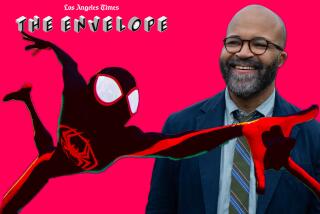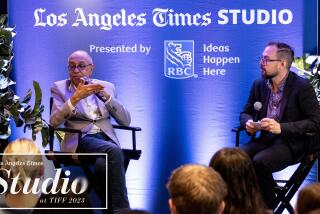Movie Review : Simple Lessons From ‘Gump’ : Turning a Particularly Harebrained Lens on Some Turbulent Decades
- Share via
Forrest Gump may have an IQ of 75, but don’t be telling him he’s slow. “What does normal mean anyway?” his mama always used to say, among other things. “Stupid is as stupid does.” A kind of holy fool who succeeds brilliantly in life while nominally wiser folk get all bollixed up, Forrest’s story offers a bemused chance to view the most turbulent decades of recent American history through a particularly harebrained lens.
There is magic in “Forrest Gump,” but almost by definition magic can’t last and it doesn’t here. In many ways a sweet piece of work with a gentle and eccentric sensibility, this Robert Zemeckis-directed film stumbles whenever it attempts what Forrest never did — forcing its charm in search of obvious sentimentality and grander points about society. Forrest would have been horrified, and, as usual, he would have been right.
Coming after “Being There,” “Rain Man” and what seems like every film starring Johnny Depp, “Forrest Gump” is a further example of Hollywood’s fascination with the mentally challenged. Given how cutthroat and dismissive an industry the movie business is, unlikely to so much as return Gump’s phone calls in real life, this determination to celebrate slowness as wisdom and to confuse the ability to make nice with moral profundity is certainly food for thought.
Convincingly played by Tom Hanks, Gump comes into view at his ease on a bus bench in Savannah, Ga., in 1981, talking away to whoever’s handy, oblivious as usual to the fact that some people are not in a mood to listen. His deliberate but charming Southern-accented voice-over (scripted by Eric Roth from a novel by Winston Groom) runs throughout the entire film, telling his story, and, not quite coincidentally, the story of America from the 1950s through the 1980s.
As a child in Alabama, Forrest (named after Confederate Gen. Nathan Bedford Forrest) is shepherded through life by his fierce mother (Sally Field, inevitably). Set apart from other children by his need to wear leg braces, he forms an instant attachment to a little girl named Jenny who asks him to sit next to her on the school bus. Like Androcles and that lion, a Gump doesn’t forget.
Although Forrest never pushes himself forward, it is “Gump’s” amiable conceit that sheer happenstance frequently puts him in a position to either witness or influence history. Even as a child, in one of the film’s most engaging sequences, he ends up having a considerable impact on the career of Elvis Presley.
Forrest’s knack for being around great events eventually results in multiple newsreel appearances, a situation that has given director Zemeckis, who can’t seem to make a film anymore without special effects (“Back to the Future,” “Who Framed Roger Rabbit,” “Death Becomes Her”), a chance to once again grandly feed his habit.
Related to the newsreels in Woody Allen’s “Zelig,” only much more elaborate and impressive, the effects--created by Industrial Light & Magic--are showstoppers, presenting Forrest convincingly interacting with several Presidents, including John F. Kennedy and Lyndon B. Johnson. Clever and light-fingered without being overdone, these effects (as well as a later subplot involving a double amputee also done on computer) are “Gump” at its best.
*
From Elvis, Forrest goes on (don’t ask how) to a football scholarship at the University of Alabama just when George Wallace made a last stand for segregation, and then to service in Vietnam (“a whole other country”), where he meets two men who have lasting influence on his life. One is fellow grunt Benjamin Buford (Bubba) Blue (Mykelti Williamson), who knows more than Forrest thought there was to know about shrimping, and the men’s superior officer, Lt. Dan (Gary Sinise), the direct descendant of a long line of military losers.
Through all of this and more, Forrest can never put sweet Jenny (Robin Wright) out of his mind. While he proceeds tortoise-like through life, she is the scattered rabbit, involving herself in every au courant movement from topless folk singing to radical politics and heavy drugs.
While Wright makes it easy to understand why Forrest remains fixated on Jenny, she has been so transparently made into Everyperson, and the film is so willing to milk the pathos in their relationship, that not enough naturalness makes it into their connection.
And as its 2-hour and 22-minute length and the care expended in capturing period make clear, “Gump” is also too eager to see itself as making larger and more important points about what America went through both pre- and post-Vietnam. How else to explain its awkward habit of having Gump mention, in a way that relates to nothing else in the film, whenever an assassination takes place.
Compared to this overreaching, Hanks is one of the film’s strengths, the look of deadpan comic determination on his face never wavering as he works to unify the movie’s diverse strands. Although Hanks never breaks through to the point where we forget that we are watching a performance, however expert, “Forrest Gump” would be in serious trouble without him.
Finally, it is as a wacky tall tale about some pretty unbelievable adventures that “Forrest Gump” works best, ironically commenting on what it takes to be a success in today’s America. It’s most successful when it is being off-center, a state of grace it doesn’t quite have the nerve to maintain.
* MPAA rating PG-13. Times guidelines: drug content, some sensuality and war violence. ‘Forrest Gump’
Tom Hanks: Forrest Gump
Robin Wright: Jenny Curran
Gary Sinise: Lt. Dan
Mykelti Williamson: Benjamin Buford Blue
Sally Field: Mama Gump
A Steve Tisch/Wendy Finerman production, released by Paramount Pictures. Director Robert Zemeckis. Producers Wendy Finerman, Steve Tisch, Steve Starkey. Screenplay by Eric Roth, based on the novel by Winston Groom. Cinematographer Don Burgess. Editors Arthur Schmidt. Costumes Joanna Johnston. Music Alan Silvestri. Production design Rick Carter. Running time: 2 hours, 22 minutes.
* In general release throughout Southern California.
JUGGLING ACT
“Forrest Gump’s” Robin Wright balances her life as a nomadic actress and mother. F7
More to Read
Only good movies
Get the Indie Focus newsletter, Mark Olsen's weekly guide to the world of cinema.
You may occasionally receive promotional content from the Los Angeles Times.











